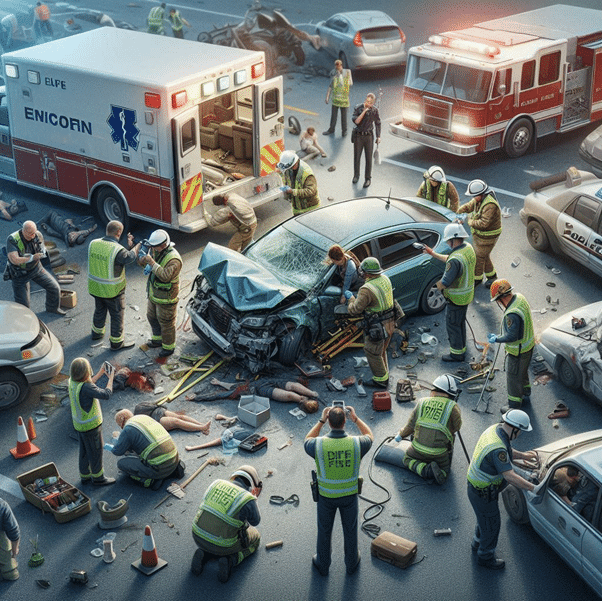Table of Contents
Image created with Microsoft Copilot
Experiencing a major accident shakes anyone to the core. Most of us find ourselves grappling with chaos and confusion in these moments. Knowing what steps to take afterward can make a world of difference.
Imagine finding yourself in this challenging situation, needing clarity and guidance on the right actions to ensure safety, legality, and proper recovery.
Reading along might offer practical insights into navigating such an event effectively.
Ensure Immediate Safety After an Accident
In the chaos of a major accident, prioritizing immediate safety becomes essential. Taking these quick steps helps minimize further harm:
- Check for Injuries: Quickly assess yourself and others involved. Call emergency services if anyone is hurt.
- Move to Safety: If possible, move vehicles out of traffic to prevent additional accidents. Turn on hazard lights to alert other drivers.
- Stay Calm and Alert: Keep your composure, helping you think clearly and make sound decisions.
Remaining calm aids in handling the situation effectively. And never leave the scene until it’s appropriate – doing so might lead to legal issues later on.
Remember that your well-being takes precedence over material concerns initially. Protecting yourself lays a strong foundation for addressing all subsequent steps responsibly.
Know Your Legal Entitlements and Duties
Grasping your legal entitlements is paramount following a serious incident, particularly if involved in a fatal truck accident. It’s not just about seeking justice but ensuring all parties adhere to the law.
Vaughan & Vaughan offer expert guidance in such situations. They help victims navigate complex legal processes that often follow these unfortunate events. Whether it’s handling insurance claims or pursuing compensation for damages and losses, knowing the proper channels is essential.
Filing necessary claims swiftly can prevent complications down the road. Moreover, comprehending liability laws specific to truck accidents helps set realistic expectations on outcomes and timelines.
Legal advice provides clarity amid confusion, offering reassurance that every step you take aligns with your best interests during these challenging times.
Contact Authorities and Emergency Services Promptly
Prompt communication with authorities ensures proper documentation of the accident. Immediately call 911, especially if there are injuries or significant property damage. The police provide an official report, capturing essential details and facilitating insurance claims later.
When speaking to emergency responders, stay factual about what happened without speculating on fault or causes. Focus on describing the scene as you experienced it.
Cooperate fully with officers during their investigation. Their objective perspective aids in clarifying events for all parties involved. This official involvement not only helps establish liability but also protects your rights.
Ensure that any medical needs receive attention swiftly through emergency services, reinforcing safety first before dealing with other post-accident responsibilities. Rapid response by these professionals lays the groundwork for resolving subsequent issues efficiently.
Gather Essential Evidence at the Scene
Collecting evidence immediately after an accident is vital for supporting any future claims or legal actions. Consider these important steps:
- Take Photos: Capture images of all vehicles involved, focusing on damage and positions on the road.
- Note Conditions: Record details about weather, lighting, and road conditions as they may influence the incident.
- Speak with Witnesses: If there are bystanders who saw what happened, gather their contact information and a brief statement if possible.
Preserving this information can substantiate your version of events later. It provides clear documentation that aids insurance adjusters and legal professionals in understanding the context more thoroughly.
Be thorough but discreet in gathering this data; it’s crucial to balance documentation efforts without obstructing official investigations or responders’ duties.
Inform Insurance Companies with Key Details
After ensuring safety and contacting authorities, notify your insurance company about the accident promptly. Sharing detailed information helps expedite the claims process and protects against potential disputes. Describe what occurred factually, avoiding speculation on fault or causes.
Including comprehensive details such as time, location, vehicle positions, and conditions aids in presenting a clear account of events. This assists adjusters in processing claims efficiently while supporting efforts to avoid misunderstandings later on.
By acting quickly to inform your insurer, you align with policy requirements that might stipulate prompt reporting.
In doing so, you’re actively participating in minimizing complications similar to how proactive communication plays a role in avoiding accidents altogether by fostering understanding among involved parties from the outset.
Reflections on Recovery and Resilience
Recovering from a major accident challenges individuals physically, emotionally, and legally. Yet, navigating these steps instills resilience and preparedness for future situations. The experience reinforces the importance of knowing one’s rights, promptly seeking help, gathering evidence effectively, and ensuring safety as primary goals.
While challenging moments test our resolve, they also offer insights that strengthen us for whatever lies ahead. Remember to lean on trusted professionals like Vaughan & Vaughan when needed.


